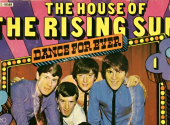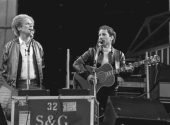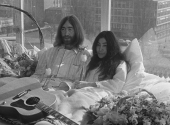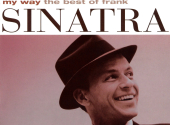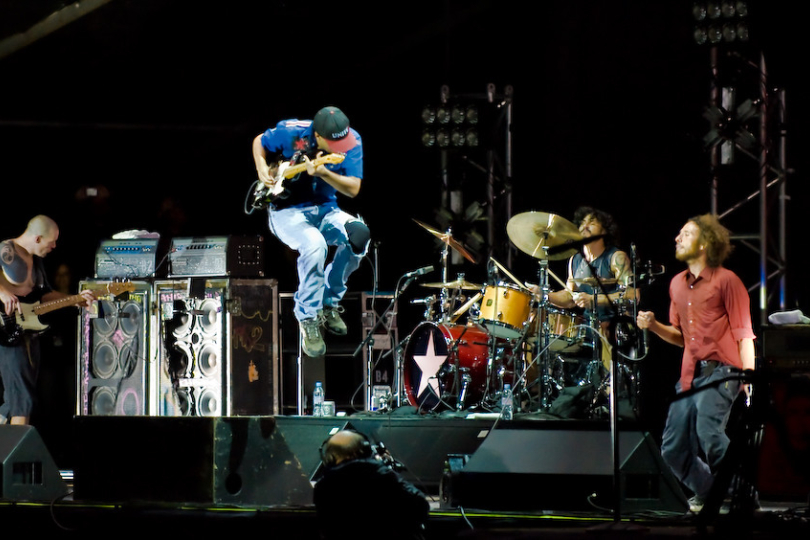
Story of a Hit #11: "Killing in the Name"
We're back with a new episode about the iconic rock band Rage Against the Machine. And what better example to delve into than one of the most memorable protest songs of the 90s? Whether you're a fan because of their political activism, controversial lyrics or just their incredible music, you can't deny that everyone has a little Rage inside them.
"Killing in the Name" started as a riff that Tom Morello created while experimenting with one of his students. He was playing around with drop D-tuning when he came up with something so good, that he had to pause the lesson to record it. The next day he brought the riff to band rehearsal and they started collaborating on what would become their most successful song.
This was 1992, only one year after vocalist Zack de la Rocha, guitarist Tom Morella, bassist Tim Commerford and drummer Brad Wilk had combined forces, as a result of the breakup and end of some of their previous groups. Their new band name, Rage Against the Machine (often abbreviated as RATM or Rage), actually came from a member of Zach's earlier band Inside Out, who had coined it in a zine in 1989. It was a perfect way to describe the music that they would produce, and "Killing in the Name" couldn't be a better example of the kind of rage they performed with.
With only a handful of lyrics, almost chant-like meets hip-hop – it clearly alludes to something. The song was in fact written as a reaction to the shocking police beating of Rodney King, which was filmed by a man from his apartment on an amateur video camera, and subsequently aired all over the nation. It became a sensation, becoming one of the most watched incidents of its kind and led to the Los Angeles riots of 1992. After a judge acquitted the four police officers responsible for the beating, masses of people all over the city went out in protest, which led to looting and arson, 63 deaths, and over a billion US$ in damage, and was only stopped after the intervention of the military.
Garth Richardson, producer of "Killing", said: "I was in LA when the whole Rodney King episode went down. That was a big thing for the city. Zack and I had a long talk about the power of speech and how whatever he needed to say, he had to say it."
The line in the verse "Some of those who work forces / are the same who burn crosses" alludes to connections between the police force and the Klu-Klux clan. And the song continues to highlight and criticise how police get away with crimes against Black, First Nations people and other minorities, a situation that continues to be a huge problem in the US to this day. Like in the chorus "Those who died are justified / for wearing the badge, they're your chosen whites". Racism and the treatment of minorities would continue to be an extremely important issue for RATM, expressed in many of their songs. In fact, only two years ago did the band collaborate on a documentary, Killing in Thy Name, that discusses the issue of "whiteness" and its role in systematic racism in the history of the States.
Their debut album, in which "Killing" stood out as the most successful track, actually featured the Pulitzer Prize-winning photograph of Thích Quảng Đức's self-immolation in 1963, in protest against the murder of Buddhists in Vietnam, by the US-backed regime of Ngo Dinh Diem. RATM were not afraid to make their music express their political voice and criticisms. Due to their involvement in protests and their strong views, multiple of their concerts have had standoffs with the authorities and police.
It was the eventual heavy circulation of "Killing in the Name" that gave RATM commercial success, but it was of course censored, even outright banned at one stage on radio in the US, due to the use of some heavy profanities. The uncensored version features 16 repetitions of the line "fuck you, I won't do what you tell me" in a climactic outro that has certainly made the song iconic. "Killing" received heavy play time on European radio, which helped grow a following overseas, however, it was mostly played in its safe and censored version. There were however several accidental uncensored plays, most famously in 1993 on BBC Radio 1, which led to scores of complaints.
Of course, RATM were not shy of putting their musical ideas into action. In 1996, after performing "Bulls on Parade" on Saturday Night Live, they attempted to hang US flags upside-down on their amps and were subsequently cut out of the rest of the show, and permanently banned. In 2000 they were filming the video clip for "Sleep Now in the Fire" directed by Michael Moore outside the New York Stock Exchange, and when Moore was taken away by police officers for not having the proper permits for filming, RATM and a crowd of fans stormed the Stock Exchange. "For a few minutes, Rage Against the Machine was able to shut down American capitalism," Moore later said.
Perhaps that's enough said about their activism and political voice – while it is an essential part of who they are as a band, it's certainly not all you could say about their music. "Killing" is not only their most famous song, but in many ways, it's musically so typical of what encompasses this great band. Heavy and addictive guitar riffs, funky yet driving drum beats and hip-hop and rap-soaked vocals.
There are a number of parts to this song, from the immediately recognisable intro with that flanger effect on the guitar to the head-banging chorus. One of the things that stands out is the mixture of major and minor tonalities, as well as the chromaticism throughout the guitar riffs. Take the guitar line in the verse for example, and you can immediately hear a minor and major third in the top two notes, it's simple enough, but it's certainly sophisticated. Take the riff in the following section, a sort of natural development of the first riff but with that delicious descending sixth.
The pre-chorus, with a straightforward series of hits, is the perfect beginning to a build-up that eventually leads to one of the most memorable outros in music. The way the band hit those chords, and Zach almost whispers "Now you do what they told ya". Building slowly until the chorus just unleashes itself, with a syncopated guitar and bass pattern to die for. And after the second chorus, a slow ascending scale leads to the iconic outro. Who knew a simple minor scale could be powerful – and I think a lot of it comes down to the contrast from the previous lyrics to the complete defiance of that outro. Check out Rick Beato's fantastic video series if you want to dive deeper into what makes this song so good, especially the fantastic and experimental guitar playing by Tom Morella.
"Killing" made a comeback in 2009 in an attempt to dethrone The X Factor from winning the Christmas number one spot in the UK, for the fifth time running. Started by an English DJ and his wife, the movement encouraged people to buy the digital track "Killing" in enough numbers to beat The X Factor single, and by mid-December, their Facebook group grew in number to over 750,000. RATM got on board, with Morello saying: "The one thing about the X Factor show ... you get to vote for one contestant or the other, but you don't really get to vote against the show itself until now." They performed "Killing" on BBC Radio 5 Live and, as requested, Zach de la Roche left the profanities out of the outro at first, but finally let loose, screaming "Fuck you I won't do what you tell me", true to form.
"Killing" made it to number one that Christmas, over 15 years after it was first released. With over 500,000 digital sales, Rage Against the Machine donated over £160,000 from the profits to charity. It also made it into the Guinness World Records for the "Fastest-selling digital track (UK)".
What do you think, do RATM seem as controversial today as they did in the 90s? What song would you pick from their library of hits?
If you have found an error or typo in the article, please let us know by e-mail info@insounder.org.


